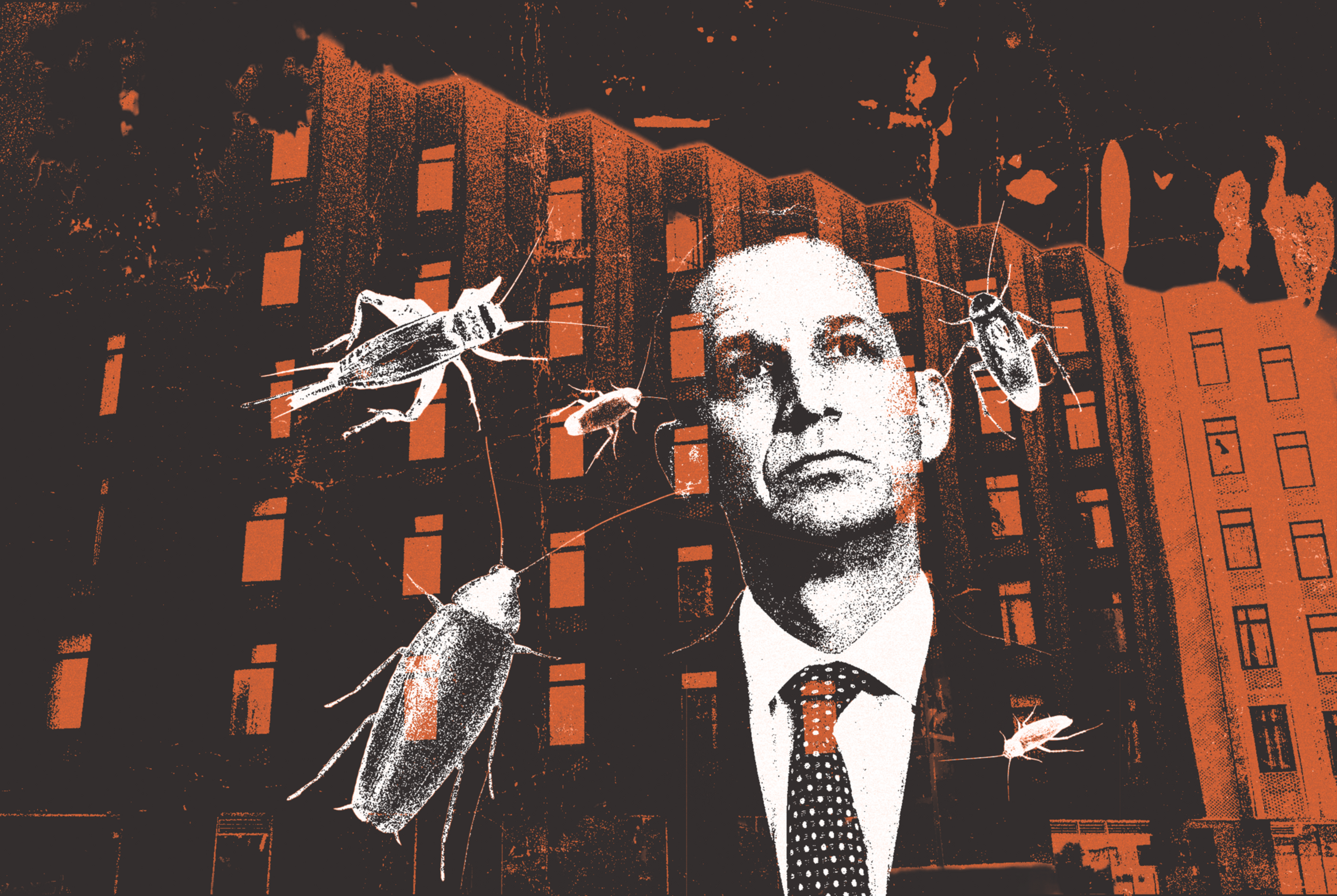Danny has unwanted roommates.
Dozens of cockroaches struggle in a glue trap in his kitchen drawer.
He’s tried just about everything to kill off the infestation, which began a month after the building at 833 Bryant St., a supportive housing facility for formerly homeless people, opened two years ago. Traps, spray, sprinkled baking soda — nothing has worked.
“That’s just from one week,” Danny said, as he showed the drawer to a reporter last month. The Standard is not publishing his real name due to fears he’ll be evicted for speaking with the media about conditions at the facility. The cabinet beneath the kitchen sink in his studio apartment was also peppered with dead cockroaches. Outside his room, roaches could be seen crawling out of other rooms and along the hallway.
“This is a brand-new building!” Danny shouted. “It shouldn’t be like this.”
The 146-unit building, managed by Mercy Housing, is rife with pests, filth, allegations of violence, and shoddy maintenance, according to residents, social workers, and city records. In addition to the roach infestation, The Standard observed a broken elevator and torn-up walls and floors during a January visit.
Construction of 833 Bryant St., also known as the Tahanan, was financed by Mayor Daniel Lurie’s nonprofit Tipping Point Community and touted by him as a shining example of how to build affordable housing at a fraction of the time and cost of other supportive housing projects in the city. (Lurie, who founded the nonprofit in 2005, stepped down as its CEO in 2019.) But residents and social workers say poor building maintenance, high staffing turnover, and inaction by management make life at 833 Bryant a filthy, dangerous nightmare.
In a September debate during the mayoral election, Lurie said 833 Bryant was built within three years at a cost of $377,000 per unit; he said this is far faster and cheaper than other supportive housing projects, which typically cost around $729,000 per unit (opens in new tab).
The building was funded in part by a $65 million gift from philanthropists Charles and Helen Schwab, who did not respond to requests for comment.
“At 833 Bryant, I built affordable housing at a fraction of the cost and time it typically takes the city. I will do it again as mayor,” Lurie posted on X after the debate.
‘I’m gonna kill you’
While 833 Bryant’s cheap and speedy construction may sound like a silver bullet in San Francisco’s fight to end street homelessness, life inside the facility is grim, with at least one shooting, filth, allegations of violence, and nearly a dozen overdose deaths.
On Jan. 2, a social worker was shot in the face and a janitor was attacked by a tenant, police and prosecutors say.
Social workers and residents told The Standard there are often fights between tenants and say they’ve had to thwart intruders who try to break into people’s rooms. Some workers said they have been followed home by residents. Many are afraid to work at the facility, especially after last month’s shooting.
“People don’t feel safe about the conditions there. Most of the clients we work with have mental health problems,” said one worker who spoke anonymously due to fear of retribution. “But it’s shot down as one of the things you just have to deal with.”
Meanwhile, at least 11 people have fatally overdosed inside since the building opened, according to the Chief Medical Examiner’s Office.
Safety issues and low pay can cause high turnover among social workers and an unwillingness to meet with clients, perpetuating an ongoing staffing shortfall. (opens in new tab)
“The crisis is not unique to [833 Bryant]; there’s a huge hiring crisis,” said Marya Wright, an Oakland-based social work consultant and educator. “One reason is threats or violence with mental health clients. At some point, it’s not worth it.”
Social workers are often sent into dangerous situations alone, Wright said, and requests to have someone accompany them for safety are usually denied by supervisors. When workers get assaulted, they often don’t bother to fill out incident report forms.


“Reports take time, and it’s like, why complete it because nothing’s going to happen?” Wright said.
Pay for social workers — who, unlike nurses, do not need to be licensed to work in California — is low. This means the jobs often go to people who lack experience and clinical training, which can lead to worse outcomes for clients, Wright said.
The average salary for a social worker in San Francisco is $86,910, according to an Indeed analysis of 99 reported salaries, although many job postings are well below that average. A salary of less than $105,000 for a single-person household is considered low-income (opens in new tab) in San Francisco.
Episcopal Community Services, which provides client services at 833 Bryant, pays $30 an hour to senior case managers with a master’s degree and $28 to $31 an hour for case managers with a bachelor’s degree and a few years of work experience, according to online job postings. Many positions do not require applicants to be licensed social workers. ECS declined to comment.

It’s not just social workers who have safety concerns at 833 Bryant. Resident Shawn Stuart, 54, said he is regularly threatened by another tenant.
Stuart told The Standard he has had at least six particularly alarming run-ins with a tenant who two months ago pulled a knife on him in the lobby.
“I’m scared of what I’ll do to him. I’ll snap, and I don’t want to be a relic in the penitentiary,” Stuart said. “Every time he sees me, he says, ‘I’m gonna kill you.’ What am I supposed to do about that?”
Stuart said he has tried to report the threats to building management but is made to feel like it’s just part of life at 833 Bryant.
“He did it in front of the desk staff, and they didn’t do anything about it,” Stuart said, his voice breaking. “I tried to file a report, and the person at the desk looked at me like I’m [stupid].”
Still, he prefers his situation to life on the streets.
Lawsuits, leaks, and ‘shit everywhere’
Resident complaints and city records outline a history of infestations, faulty fixtures, and broken elevators, which disproportionately affect disabled residents.
Issues identified in 24 complaints in the Department of Building Inspection’s database and a June lawsuit filed by 44 residents against Mercy Housing include:
• Elevator breakdowns
• Water leaks
• Mold
• Bed bug, cockroach, and rodent infestations
• Exposed electrical wires
• Frequent light outages
• Poor insulation
• Apartments without heating
• Malfunctioning smoke detectors
• Inadequate emergency exits
• Unsafe on-site construction
• Inadequate garbage disposal
• Faulty sewage systems
• Lack of security, allowing people to enter the building off the street.
Most of the Building Inspection complaints have been closed. Among those that remain open, one filed in 2023 cites an elevator that had been broken for a month, exposed electrical wires in the ceilings on each floor, and water leaks.

Tipping Point is not involved in tenant issues or property management at 833 Bryant. Mercy Housing did not respond to requests for comment on conditions inside the building.
Jason Quinones lives on the fifth floor and has used a knee scooter since having his foot amputated due to diabetes complications around a year ago. He said at least one of the two elevators is broken four days a week, and it’s not uncommon for both to shut down, forcing him to crawl upstairs to his room. Quinones said he has missed doctor appointments due to the elevator issues.
“They said they were gonna be helping people,” he said. “Next thing you know, they’re letting anyone in. There’s animals, shit everywhere, the elevator hardly works.”
Another resident, Shawn Savoy, 48, said tenants who bring in furniture and other items from the street are likely to blame for the pests in the building.

“The bugs are the biggest thing; you see them crawling around here,” Savoy said. “But it’s better than being homeless.”
A social worker said many residents have a tendency to hoard, a behavior likely carried over from time living on the street.
“If you have a collector mindset, a client sees something as a treasure, they’re gonna hold onto it,” the worker said, adding that tenants decide what gets thrown out during trash collection times.
A spokesperson for Lurie emphasized that the mayor and his office are not responsible for how 833 Bryant is run and referred The Standard to Mercy Housing and the city’s Department of Homelessness and Supportive Housing.
The HSH acknowledged “challenges” in running permanent supportive housing projects, including tenants not paying rent, security issues, and heavy damage to units. All of the residents of 833 Bryant are formerly homeless and extremely low-income, the department said.
HSH said Mercy Housing hired security for the building in 2023. A social worker said security officers typically work from 5 p.m. to 2 a.m.
“HSH has made significant capital investments in the Tahanan (833 Bryant) to enhance the living conditions and overall experience for residents and we continue to work closely with our nonprofit partners to address and rectify the challenges at the Tahanan, so clients can stabilize and move forward on their pathway out of homelessness,” the department said in an emailed statement Monday.

Tipping Point Community CEO Sam Cobbs said he became aware of issues with fires, flooding, and broken elevators after The Standard published a story about the building in September.
He said he has been in contact with Mercy Housing and Episcopal Community Services to form an action plan to address issues with quickly repairing water damage and broken elevators.
Cobbs added that he believes staffing shortages are to blame for the building’s maintenance issues and that there aren’t enough social workers on staff for the 833 Bryant residents, many of whom are formerly homeless and need acute care. He said that Mercy Housing and ECS need more city funding to ensure they can hire more staff.
“Our job was building housing faster and cheaper than the status quo, which I’m proud of,” Cobbs said Monday.
Stuart, who doesn’t want to live on the street again, feels demoralized by how quickly the building has deteriorated.
“The condition of this building, the mold, the roaches. It’s pitiful, It’s sad. It’s been less than five years,” Stuart said. “This building needs to be looked into.”

